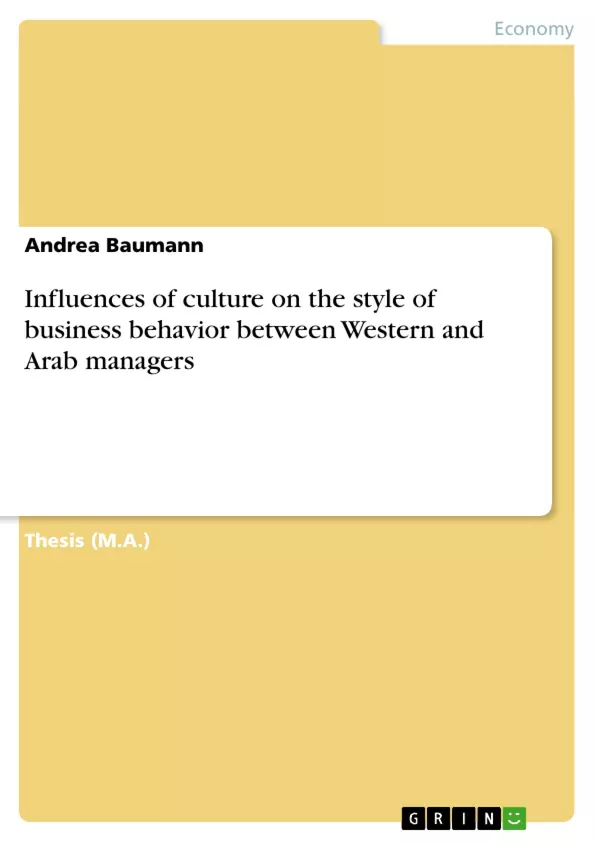International business activities are expanding significantly and so awareness of both cultural similarities and differences is becoming increasingly important. Internationalization is no longer a foreign word and more and more business people now undertake the task of doing business outside of their home country. To succeed in international business requires an understanding of various cultures and the sensitivity to cope with differences. While doing business with people from many nations, a sense of dealing with conflicting approaches is inevitable. Managers with global views and skills in international communication are more sought after than ever. At the same time, managers are seeking ways to participate in cross-cultural management and to avoid any misinterpretation.
Inhaltsverzeichnis (Table of Contents)
- Introduction
- Introduction to the Arab World
- Islam
- Culture
- Cultural Models
- The Arab Society
- Arab Executives
- Business Attitudes
Zielsetzung und Themenschwerpunkte (Objectives and Key Themes)
This master's thesis aims to analyze the influence of culture on business behavior between Western and Arab managers. It investigates the cultural differences between these two worlds and explores how these differences affect business practices and interactions.
- Cultural dimensions and their impact on business communication
- The role of Islam in shaping Arab business practices
- Key differences in negotiating styles between Western and Arab cultures
- Challenges and opportunities in intercultural business communication
- Strategies for successful intercultural collaboration in a globalized world
Zusammenfassung der Kapitel (Chapter Summaries)
The thesis begins with an introduction, defining the two worlds under consideration - Western and Arab - and outlining the research problem and objectives. Chapter 2 provides an introduction to the Arab world, including its history, economic profile, and the importance of petroleum and the Islamic banking system.
Chapter 3 explores the tenets of Islam, the Qur'ān, and the five pillars of Islam. Chapter 4 delves into the concept of culture and its impact on intercultural communication, specifically examining verbal and nonverbal communication.
Chapter 5 introduces cultural models, particularly Hofstede's four dimensions and the role of context in communication. Chapter 6 examines the Arab society, focusing on Arab values and various types of individuals within the Arab culture. Chapter 7 then delves into the characteristics of Arab executives, including their negotiating styles and nonverbal business behavior.
Schlüsselwörter (Keywords)
The main keywords and focus topics of this thesis include cultural differences, business behavior, intercultural communication, Arab culture, Islam, Western culture, negotiating styles, nonverbal communication, global management, and intercultural competence.
Frequently Asked Questions
How does culture influence business behavior between Western and Arab managers?
Culture affects communication styles, negotiation tactics, the importance of relationships, and the perception of time, which can lead to misunderstandings if not properly understood.
What is the role of Islam in Arab business practices?
Islam shapes values such as trust, honor, and fatalism (Inshallah). It also influences practical aspects like prayer times, fasting during Ramadan, and the prohibition of interest in Islamic banking.
What are the main differences between monochronic and polychronic time cultures?
Western cultures are often monochronic (focus on schedules and punctuality), while Arab cultures tend to be polychronic (focus on multiple tasks and relationship-building over strict timelines).
How do nonverbal communication styles differ?
Arab business culture often involves closer physical distance, more intense eye contact, and frequent touch (among same-sex colleagues) compared to the more reserved Western business etiquette.
What are Hofstede's cultural dimensions relevant to this comparison?
Key dimensions include Power Distance (higher in Arab societies), Uncertainty Avoidance, Individualism vs. Collectivism, and Masculinity vs. Femininity.
- Citar trabajo
- MMag, MBA Andrea Baumann (Autor), 2006, Influences of culture on the style of business behavior between Western and Arab managers, Múnich, GRIN Verlag, https://www.grin.com/document/82889



